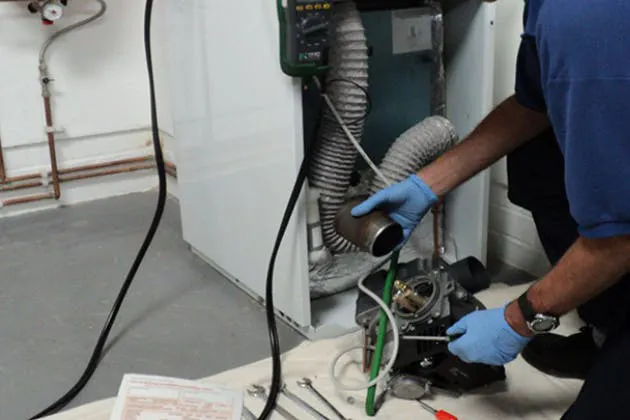Oil-fired combi boilers represent a sophisticated approach to home heating, offering homeowners an efficient and streamlined alternative to traditional heating systems. Unlike conventional setups that require separate hot water tanks and complex pipework, these innovative systems deliver instant hot water and consistent heating directly from the mains, all powered by stored oil.
From energy efficiency and installation requirements to maintenance tips and cost considerations, we'll break down everything you need to know about combi oil boilers – ensuring you have the knowledge to select the most suitable heating solution for your home.

Understanding Combi Oil Boilers
A combi oil boiler is a heating system that combines central heating and hot water production in a single unit. Unlike traditional systems that require separate components for heating and hot water, combi boilers offer an integrated solution powered by oil.
How Combi Oil Boilers Function
These boilers use oil as their primary fuel source, stored in an external tank. When hot water is required, the boiler heats water directly from the mains supply, providing instant access without the need for a storage cylinder. For central heating, the boiler circulates hot water through radiators or underfloor heating systems, maintaining desired temperatures throughout the property.
The heating process begins when oil is drawn from the storage tank and atomised in the burner. This fine mist is then ignited, creating a flame that heats a heat exchanger. Water passing through this exchanger is rapidly heated and distributed as needed.
Advantages of Combi Oil Boilers
- Energy Efficiency: Modern oil combi boilers boast impressive efficiency ratings, often reaching 92-95% or even 97%. This high efficiency translates to lower fuel consumption and reduced energy bills.
- Cost-Effectiveness: Despite fluctuations in oil prices, these boilers generally offer lower running costs compared to alternatives, particularly in areas without access to mains gas.
- Space-Saving Design: The compact nature of combi boilers makes them ideal for properties with limited space. By eliminating the need for separate hot water cylinders, they free up valuable storage areas.
- Flexibility: Oil combi boilers can be integrated with renewable energy systems, such as solar thermal panels, offering a hybrid approach to heating and hot water production.
- Instant Hot Water: Unlike systems reliant on stored hot water, combi boilers provide hot water on demand, ensuring a consistent supply without the risk of running out.
Drawbacks to Consider
- Oil Storage Requirements: A significant consideration is the need for an oil storage tank. This tank must be installed externally, requiring adequate space and adherence to safety regulations.
- Noise Levels: Internal models can produce noticeable noise during operation. While external models mitigate this issue, they may not be suitable for all properties.
- Oil Supply Dependence: Reliance on oil deliveries means homeowners must manage their fuel supply carefully to avoid running out, particularly during peak usage periods.
By understanding these key aspects of combi oil boilers, property owners can make informed decisions about their heating systems, balancing efficiency, convenience, and long-term costs.
Types of Combi Oil Boilers
Internal vs External
Internal models are installed within the property, typically in utility rooms or kitchens. External models are designed for outdoor installation, reducing noise inside the home and freeing up internal space.
Condensing Technology
Since 2007, all new oil boilers must be condensing models. These boilers extract additional heat from exhaust gases, significantly boosting efficiency.
Installation and Maintenance
Professional installation is crucial for optimal performance and safety. A thorough assessment of the property's heating requirements, suitable locations for the boiler and oil tank, and potential upgrades to existing pipework should be conducted prior to installation.
Regular maintenance is essential to ensure longevity and efficiency. Annual servicing by a qualified technician is recommended, alongside periodic power flushing to remove sludge and debris from the system.
Homeowners should also monitor oil levels regularly, schedule timely refills, and be aware of any changes in boiler performance that might indicate the need for maintenance or repairs.
FAQs
Contact Us
Contact our heating engineers in Richmond, York and Harrogate to discuss your specific needs and explore the best heating solutions for your York home. You can reach us at 08001182467 by filling in our online contact form.


